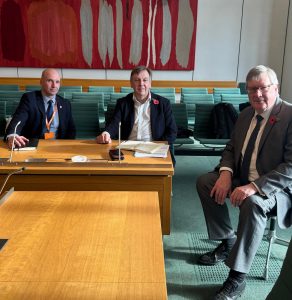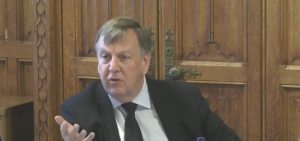On 28 October, a panel discussion was held at the House of Commons focused on prospects for Ukraine following the 26 October parliamentary elections in the country.
Chaired by John Whittingdale MP, Director of the British Ukrainian Society and Chairman of the British-Ukraine All-Party Parliamentary Group, the panel discussion was jointly organised by the Ukraine Crisis Media Centre and the Russia Studies Centre at The Henry Jackson Society.
The panel examining the outcomes of the parliamentary elections included Nataliya Popovych, Co-Founder and Board Member of Ukraine Crisis Media Center, Dr. Olga Onuch, a Senior Lecturer in Politics at the University of Manchester, Dr. Andrew Wilson, a Senior Policy Fellow at the European Council on Foreign Relations, Sergiy Sydorenko, Editor-in-Chief of ‘European Pravda’, Vasyl Myroshnychenko, Director and Head of the Ukrainian office of the Ukrainian-British City Club, and Dr. Andrew Foxall, Director of the Russia Studies Centre at The Henry Jackson Society.
The panellists highlighted the democratic and transparent course of the elections, even though only 423 out of 450 MPs could be elected to the Parliament given the lack of voting in Crimea and some regions of Donetsk and Lugansk controlled by pro-Russian separatists.
Following the February 2014 revolution in Ukraine, it was important that the diversity of political parties and emerging civic society groups who participated on Maidan, many of which are of liberal persuasions, were fully represented in the new Parliament.
But as Nataliya Popovych noted, many activists realized they couldn’t go through to the Parliament as one new political force, so they dispersed among the more established political parties. As the result of this big spread, some of the most deserved activists of Maidan failed to come through to the Parliament. It also led to the fact that big numbers of voters were making last minute decisions when casting their ballots, as many of the candidates they would be ready to vote for belonged to a number of parties at the same time.
Commenting on the results of the elections, the panellists noted that, with their choice of political parties, Ukrainians demonstrated their focus on a pro-European future of Ukraine, and that it was important to continue the ongoing de-sovietisation of the country which, for the first time in the 23 years of Ukraine’s independence, resulted in the Communist Party failing to make it to the Parliament.
As to how these elections will influence the political landscape of Ukraine, some discussion participants stressed that President Poroshenko should be interested in a broad coalition in order to reach constitutional majority so that the new Parliament is capable of introducing necessary reforms.
The speakers concluded by expressing their hope that, following the 26 October parliamentary elections, the people of Ukraine will finally see the emergence of the rule of law in the country, and urged the new Parliament to work hand-in-hand with the Government to take Ukraine from the ‘revolution of dignity’, through economic hardship and a military conflict, to the ‘country of dignity’.



